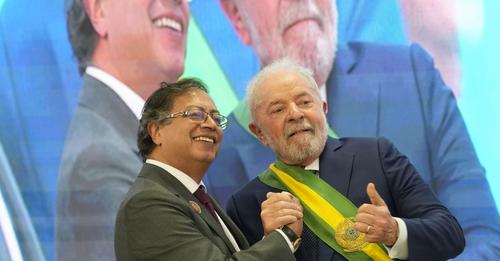World
Brazilian and Colombian leaders meet to create momentum for the Amazon Summit

Luiz Inácio Lula da Silva, the president of Brazil, and Gustavo Petro, the president of Colombia, met on Saturday to advance plans for a regional summit on the Amazon rainforest and intensify preservation efforts.
The gathering was held at Leticia, Colombia, a city in the triple border zone of the Amazon between Colombia, Brazil, and Peru where organized crime has recently tightened its grip.
The purpose of the gathering was to establish the basis for the Amazon Summit, which will be held in Belem the following month. Leaders from the nations that are signatories to the Amazon Cooperation Treaty Organization—Bolivia, Brazil, Colombia, Ecuador, Guyana, Peru, Suriname, and Venezuela—will attend that meeting.
A united statement from the summit is what Lula is urging be given at the COP28 United Nations climate conference in Dubai in November.
As she sat next to Petro in Leticia, Lula added, “We will have to demand collectively that rich countries fulfill their pledges.
Petro emphasized the necessity of a united front to put pressure on industrialized nations.
In his words, “Today that is nothing other than the destruction of life. We felt that development was the killing of trees.
According to the Colombian president, investing trillions of dollars will be necessary to address the climate catastrophe. Changing the global debt structure and “trading debt for climate action,” as he put it, may accomplish this.
August 16, 2020, in Para state, Brazil, south of Novo Progresso.
According to a statement from Brazil’s presidential palace, the final document would include policies for the sustainable development of the Amazon, preservation of the biome, and advancement of social inclusion, science, technology, and innovation while valuing Indigenous peoples and their knowledge.
The statement added that cooperation among the nations that border the Amazon biome was essential for overcoming the region’s many problems.
One issue is the increased power of organized crime, especially in tri-border areas like Leticia. Last year, the nearby Javari valley region saw the deaths of Indigenous campaigner Bruno Pereira and British journalist Dom Phillips.
According to a June study from the U.N. Office on Drugs and Crime, these places have turned into violent hotspots. It was noticed that criminal organizations are involved in both the exploitation of natural resources and the trafficking of cocaine.
The survey also noted that forced displacements, mercury poisoning, and other health-related effects, as well as greater susceptibility to violence, are among the ways in which indigenous people are disproportionately impacted by the criminal nexus in the Amazon.
The Leticia Pact was signed in 2019 by Colombia, Bolivia, Ecuador, Brazil, Peru, Guyana, and Suriname to improve coordination of efforts to protect the Amazon’s natural resources.
However, according to Marcio Astrini, executive secretary of the Climate Observatory, a federation of environmental organisations, the objectives are ambiguous and do not include any means of gauging progress.
Lula has worked to make his third term’s top priorities the preservation of the environment and respect for the rights of Indigenous peoples since he took office in January. He was successful in getting international contributions to the Amazon Fund, which fights deforestation, to resume. He also started a military operation to drive out illegal miners from Yanomami land and pledged to stop all deforestation by 2030.
Petro has also spoken out in favor of stopping the Amazon’s degradation. The president of Colombia has suggested setting up a multinational 20-year finance fund to aid rural communities that contribute to deforestation. Instead, the plan is to pay them for sustainable and regenerating activities.
According to Wagner Ribeiro, a geographer and expert in environmental policy from the University of Sao Paulo, cooperation between Brazil and Colombia, which share a border that is more than 1,500 kilometers long, has historically been insufficient.
“We anticipate that the meeting will present opportunities for academic collaboration that, in turn, will lead to the development of public policies that support environmental conservation,” added Ribeiro.
